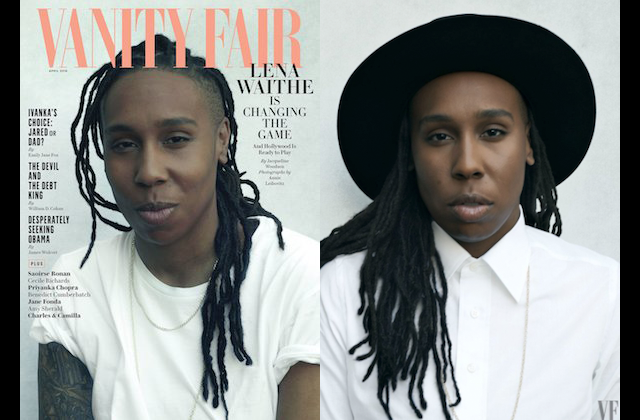Vanity Fair magazine celebrates the impact that "The Chi" creator Lena Waithe is making on the entertainment industry by featuring her on its latest cover.
With a breakout TV series, a historic Emmy, and a propulsive role in Steven Spielberg’s #ReadyPlayerOne, screenwriter-producer-actress—and V.F. cover star—@LenaWaithe is re-writing the rules for the next generation https://t.co/1i72DVMOFg #VFxLena pic.twitter.com/zlgkYBCyZM
— VANITY FAIR (@VanityFair) March 22, 2018
CNN notes that this is the first issue overseen by Radhika Jones, the new editor-in-chief of Vanity Fair. "What kind of writer do you enlist to write about a writer?" Jones asked in a letter accompanying the new cover story. "In this case, one who’s having a bit of a year herself: Jacqueline Woodson, the National Book Award–winning author of ‘Brown Girl Dreaming,’ who was named the National Ambassador for Young People’s Literature by the Library of Congress in January."
Here, a few passages from the profile that speak to Waithe’s creative pursuits both on- and off-camera:
On Waithe finding herself during childhood, in the second-person:
Already you know there isn’t a mirror the television is holding up to you; there isn’t a child like you on the screen. Not in the 1990s. Not yet. So you find your strength and a deep belief in yourself in the streets and family dinners of Chicago—a place you call home, a long way from your grandmother’s own Arkansas. You’re clear-eyed and queer from the womb, born as part of a larger narrative—that of the Great Migration. Already, there is resistance running through your veins. Already, at seven, you know your own dream.
On her Emmy and her work to highlight emerging artists:
“How has the Emmy changed me? It got me all these meetings that I go in and say I’m too busy to work with you—you should have hollered at me. You can take my call when I call you about this Black queer writer over here who’s got a dope pilot, or this person over here who’s got really cool ideas, or this actress who’s really amazing but nobody’s seen her.”
On "Master of None" colleague Aziz Ansari and the sexual misconduct allegations he faced:
Lena gets quieter, more thoughtful. “At the end of the day,” Lena says, “What I would hope comes out of this is that we as a society…educate ourselves about what consent is—what it looks like, what it feels like, what it sounds like. I think there are both men and women who are still trying to figure it out. We need to be more attuned to each other, pay more attention to each other, in every scenario, and really make sure that, whatever it is we’re doing with someone else, they’re comfortable doing whatever that thing is, and that we’re doing it together. That’s just human kindness and decency.”
On celebrating Black gay identity:
“I am tired of White folks telling my stories. We gotta tell our shit. Can’t no one tell a Black story, particularly a queer story, the way I can, because I see the God in us. James Baldwin saw the God in us. Zora saw the God in us. When I’m looking for myself, I find myself in the pages of Baldwin.”
Then she adds, “I didn’t realize I was born to stand out as much as I do. But I’m grateful. Because the other Black or Brown queer kids are like, ‘Oh, we the shit.’” Lena flashes a huge smile, then shakes her head with wonder.
Read the full story at VanityFair.com.
